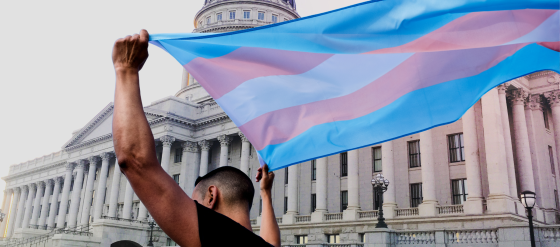The ACLU of Utah, along with cooperating attorneys from the Salt Lake City law firm Parr, Brown, Gee & Loveless, will be appearing before the Utah Supreme Court on October 25th for a hearing on whether a controversial injunction issued in Weber County should be subject to immediate appeal in the state’s highest court.
On August 20th, Weber County attorneys filed a complaint with the Second District Court in Ogden, asking the court to declare the “Ogden Trece” a public nuisance and impose a multi-faceted injunction regulating the activities of Ogden residents identified by the police as alleged members of the Ogden Trece
The Ogden Trece has been described in various court filings and newspaper articles as a “criminal street gang” consisting of several hundred members and operating largely within the Ogden City limits.
“Law enforcement certainly has an interest in stopping organized crime,” states ACLU of Utah Legal Director Darcy Goddard. “But there is no evidence here or elsewhere that so-called ‘gang injunctions’ are actually effective long-term. Nonetheless, in exchange for the County’s tenuous and unsupported promise of the possibility of ‘reduced crime,’ this injunction criminalizes a wide range of otherwise legal and constitutionally-protected activity, for literally hundreds of people, without any judicial determination that these individuals are, in fact, members of a ‘gang,’ or that they have committed any crime.”
The ACLU of Utah attempted to address the constitutional concerns raised by Weber County’s injunction by asking the court
for permission to file an amicus curiae “friend of the court” brief describing a number of fundamental conflicts between constitutional rights and the prohibitions contained in the injunction. After Judge Ernie Jones denied the ACLU of Utah amicus status, the organization joined with defense attorneys in the case to file an expedited interlocutory appeal in the Utah Supreme Court.
The injunction sought by the Weber County attorneys (and subsequently granted by the Second District Court) includes a wide range of prohibitions intended to help curb criminal activities. Individuals identified as members of the Ogden Trece and served with a copy of the court’s order granting a preliminary injunction are prohibited from associating with other “known member[s] of Ogden Trece,” possessing (otherwise legal) firearms “in public view or any place accessible to the public,” possessing “graffiti tools,” (including felt tip markers) using or selling drugs, having an open container of an alcoholic beverage “anywhere in public view or any place accessible to the public” (excluding “properly licensed premises”), and being on property without prior written permission. The injunction also includes an 11 p.m. curfew for Ogden Trece members, with exceptions for travel to and from employment and certain “entertainment events.”
“Courts ranging from the United States Supreme Court to the Supreme Court of Utah have universally recognized that the unjustified deprivation of First Amendment freedoms causes irreparable injury to those whose liberty is infringed,” said ACLU of Utah cooperating attorney David Reymann. “For this injunction to remain in place before the Utah Supreme Court is able to weigh and address the grave constitutional questions raised by such a broad and overreaching lower court order would result in irreversible injury to those against whom it would be enforced.”
The ACLU of Utah’s concerns include the injunction’s broad scope and unconstitutional vagueness. Unlike civil gang injunctions in California that apply to certain neighborhoods with an area of a few blocks, the Weber County injunction encompasses anybody living within the entire city of Ogden. The term “anybody” is not used lightly here; “gang members” are identified by individual police officers using a set of loose criteria, including the color and type of clothing worn and who they are seen associating with. Thus, it is possible, and even likely, that an entirely innocent person wearing “gang” clothing (described as including sports jerseys from the Utah Jazz or the Dallas Cowboys) and seen associating with a “known” member of the Ogden Trece (although not necessarily known to the individual in question) could be labeled a gang member, served with the injunction, and thereafter stripped of a number of fundamental civil liberties.
The injunction is an attempt to deter future criminal conduct by imposing restrictions on the freedom of movement or association and other liberties of free citizens. Such restrictions are inherently dangerous in a nation founded on strong ideals of individual liberty and sovereignty. The criminal activities described by Weber County as warranting the injunction are indeed dangerous themselves, but it is already illegal to sell drugs or participate in drive-by shootings, and there are stiff criminal penalties awaiting those who engage in such activities. Our criminal justice system proceeds by facts and investigation, not predictions and speculation.
To find more details of this case and the results of the Utah Supreme Court hearing please visit >>
